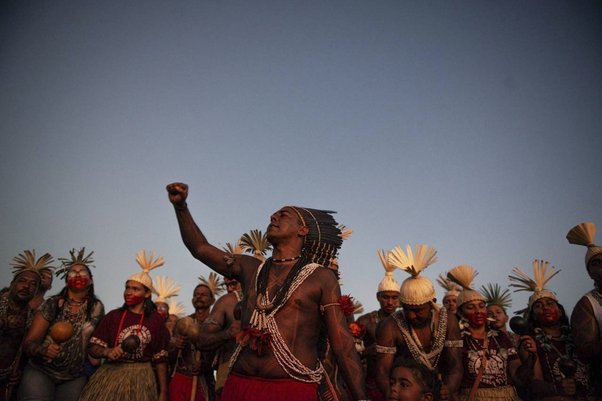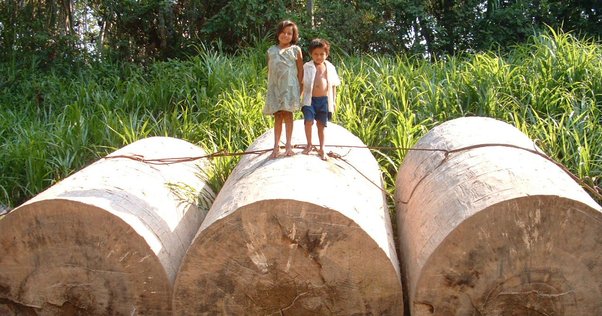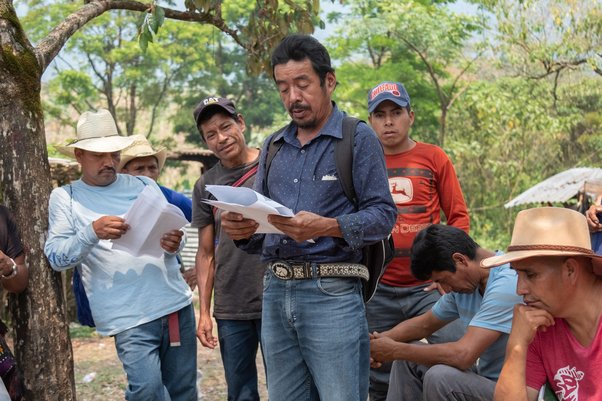For more than a decade, we've been documenting and celebrating the hard-fought wins of land and environmental defenders worldwide. Together, their efforts not only help to prevent environmental destruction and human rights harms by companies, but also help to protect the environment from the worst effects of climate change.
Last night, the final episode of BBC’s Planet Earth III celebrated the work of defenders all over the world in protecting the planet – including Alessandra Korap, a leader of the Munduruku Indigenous group from the Amazon. The episode highlighted the importance of preserving the Rainforest for humanity, as the most diverse terrestrial habitat on the planet, but also the dangers faced by communities across the region. It also quoted our grim statistics: in the last decade, more than 300 people have been murdered in Brazil defending the environment.
Defenders globally continue to face reprisals after speaking out to protect the environment. At least 1,910 land and environmental defenders around the world have been killed since 2012, with 177 cases in 2022 alone. Of these killings last year, 88% occurred in Latin America - a region consistently found to be the most dangerous place in the world for activists.
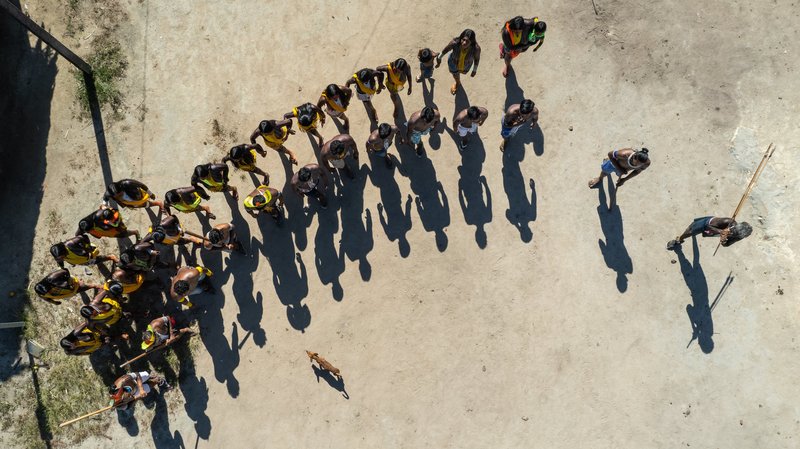
The Kayapó, one of the largest Indigenous groups in Brazil, face ongoing threats to their land and livelihoods as a result of destructive business projects in the amazon. (Cícero Pedrosa Neto / Global Witness)
Stretching over multiple country borders, the Amazon itself has been the location of many of these attacks over the past decade - with defenders facing extreme danger as they work to prevent the forest from deforestation – often linked to mining, agriculture, and drug trafficking. Last year, one in five defender killings globally took place in the Rainforest.
Of the most dangerous places in the world to be a defender, Colombia tops the list, with at least 382 killings in the last decade, followed by Brazil. In Peru, a country with large amounts of its territory covered by Amazon, at least 54 activist have lost their lives.
As long as there is insufficient effort made to bring perpetrators to justice, these tragedies will undoubtedly continue.
Taking stock of more than a decade of data on defender killings, we’re reminded of the damage that high impunity rates have on communities, Indigenous peoples and climate defenders. Impunity is consistently named as a key driver behind attacks on defenders by the UN Special Rapporteur on the situation of human rights defenders, Mary Lawlor, whose office has repeatedly noted how failures to properly prosecute perpetrators have fueled further attacks. This is no coincidence. Every perpetrator who walks free sends a fatal message to defenders and activists worldwide.
Just last month, a retrial of five men in Peru began for the 2014 murder of four Indigenous Saweto leaders Their conviction and 28-year sentences were suddenly overturned – six months after the verdicts were first announced in February this year. What could have marked a historic turning point has instead cruelly resulted in their relatives and communities being forced to relive the horrific events from more than eight years ago - while also having to endure yet another criminal trial far away from their homes and families.
This impunity must end.
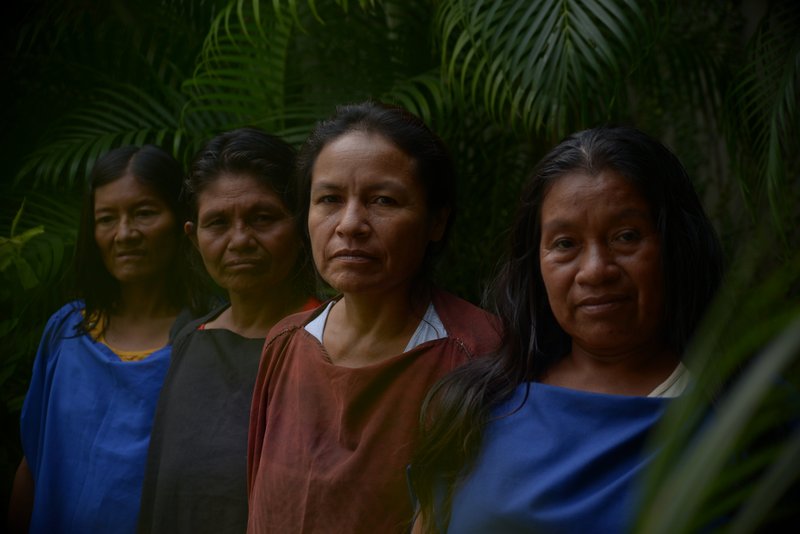
Adelina Vargas, Lita Rojas, Julia Pérez, and Ergilia Rengifo (from left to right) have been seeking justice for their murdered husbands for nearly a decade. (Pablo Sánchez / LVU)
In addition to killings and physical violence, defenders face the growing risk of criminalization - legal methods to harass, threaten, and stop their work - used to silence and prevent them from speaking out.
Defenders are being threatened, arrested, sentenced to prison under laws targeted at activists or for fraudulent claims, or hit with costly civil lawsuits such as defamation. For many of these actions by government or private actors, defenders can face pre-trial detention, lengthy sentences, stigmatization, and financial harms, alongside long stressful court cases, because of this misuse of the justice system.
But there is hope.
In September 2023, following years of campaigning by Indigenous groups and human rights organizations in Brazil, the Supreme Court quashed a time-limit policy that would make it easier for agribusiness companies and cattle farmers to steal Indigenous land. The abandoned policy sought to remove Indigenous people’s legal rights to their land unless they proved they were occupants at the time of Brazil’s current Constitution – more than 35 years ago.
Given the violent removal of Indigenous peoples from their ancestral homes, poor record keeping, and nomadic nature of many tribes, this legal loophole violated the rights of Indigenous groups, preventing them from living and subsisting on their own land.
The future of our planet depends on the continued stewardship of Indigenous people over their ancestral land, with Indigenous practices cited as protecting 80% of the world’s biodiversity. We simply cannot meet the 1.5°C limit and prevent devastating consequences on human life without the efforts of environmental defenders.
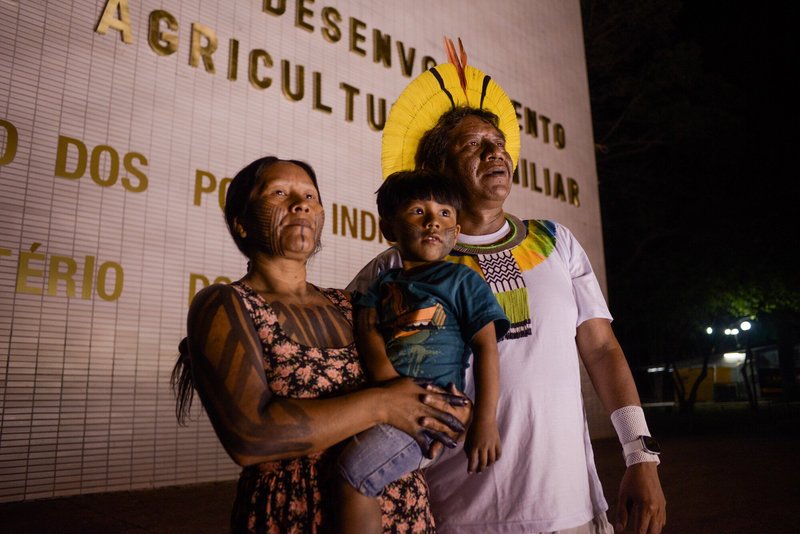
Doto Takak Ire, Indigenous leader of the Kayapó People, and his family in front of the Ministry of Indigenous Peoples with a sign saying “Indigenous peoples, future", in Brasilia, on 9 June 2023. (Karina Iliescu / Global Witness)
This momentous court win in Brazil will help Indigenous communities protect large swaths of the country from the destructive forces of deforestation and mining. This is not just a win for Brazilian communities, but for all of us.
We are also seeing progress beyond Brazil that could affect communities the world over. This week, the EU appears set to agree a new law – the Corporate Sustainability Due Diligence Directive (CSDDD) – that could help prevent companies from profiting from human rights abuses and environmental destruction - and allow affected communities to hold companies accountable for abuses. The law could mean that when companies operating in the EU cause harm anywhere in the world, affected communities obtain support in overcoming the barriers that currently prevent them from seeing justice in court.
It could mean huge progress for defenders worldwide. Other world leaders must follow suit in putting defenders’ rights at the forefront of climate and sustainability policy.
We will continue to call for justice for the journalists, Indigenous peoples, land and water defenders, climate protesters, and all others who have faced harm – and lost their lives - in trying to protect their land, homes and the environment. We call on governments around the world to investigate their killings and attacks against them - and hold those responsible for these to account. We also call on them to protect the essential rights of freedom of expression and public participation.
Without protection, defenders cannot continue their work. And without defenders, our planet – and all of us – will face the consequences.
